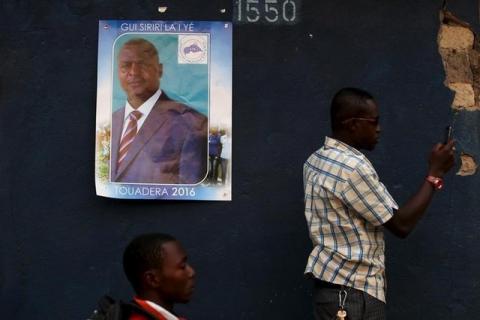Advertisement
Central Africans head to the polls under a shadow from the past
BANGUI (Reuters) - The smiling faces of two former prime ministers, Anicet-Georges Dologuele and Faustin-Archange Touadera, gaze out from thousands of campaign posters plastered across Central African Republic's dusty riverside capital Bangui.
The spectre of a third man, exiled former ruler Francois Bozize, looms just as heavily over the presidential run-off vote on Sunday. With it comes the risk that the vote may change little if anything, no matter who wins it.
Central African Republic, a majority Christian country rich in gold, uranium and diamonds but too unstable to mine them profitably, has been torn between Muslim Seleka rebels and Christian "anti-balaka" militias since the rebels ousted Bozize in early 2013.
The violence has killed thousands, forced one in five residents to flee and led to de facto partition along ethnic and religious faultlines. Seleka withdrew from Bangui in 2014 and an interim president was named to lead a transition to democracy.
But as the final vote nears, the absent ex-president still has influence as head of the largest political party. He is said to be in contact with both candidates and accused of keeping ties to some anti-balaka militias at the heart of the conflict.
"Bozize could be the real winner," one western diplomat said of the former president, who has lived mainly in Uganda since his 2013 ouster and is currently the target of an international arrest warrant and United Nations sanctions.
A former high-ranking army officer, Bozize seized power in a coup in 2003 and won elections in 2005 and 2011. Seleka rebels, accusing him of misrule and neglect, overthrew him in 2013.
Abuses by Seleka fuelled the rise of Christian militias - some including soldiers from Bozize's army - that launched ethnic cleansing-style reprisals against Muslim civilians.
The various factions of the old Seleka coalition (the name means "Alliance" in the local Sango language) control parts of the northeast while the Christian militias, known as "anti-balaka" (anti-machete), roam the south and southeast.
Although a precarious calm has held during the campaign and vote, some 11,000 U.N. peacekeepers and a contingent of soldiers from former colonial master France have done little to counter the influence of the armed groups.
CLOSE TIES
Both Dologuele, a banker who has served in regional financial institutions, and mathematics professor Touadera claim to hold the key to Central African Republic's salvation.
Touadera has cast himself as a trustworthy leader capable of combating corruption and uniting the country across religious and ethnic divides. Dologuele has highlighted his finance experience as he touts a plan to attract foreign investors.
Pocketbook issues such as jobs have come up in campaign speeches, but just as important to voters are the candidates' close ties to Bozize, whose bid to run again was rejected by the constitutional court.
Touadera, running as an independent, was the former president's longest serving prime minister - from 2009 to 2013 - and a top official in his Kwa Na Kwa (KNK) party.
Despite heading his own party, Dologuele has garnered Bozize's endorsement, fostering speculation that the deal with his KNK party secretly included amnesty for its exiled leader.
"(The KNK) found itself with supporters who no longer knew who to turn to," he told Reuters in denying the accusation. "When you're in politics and you ignore the biggest contingent of supporters, then you're missing out."
While the fight for the KNK's supporters may determine the outcome of Sunday's vote, being too close to Bozize risks creating problems after the polls.
Seleka, who fought to topple Bozize and still control half the country, are unlikely to hand back territory to a president they view as a mere proxy for him. And any move to allow Bozize himself to return to Bangui could prove inflammatory.
YESTERDAY'S GUY?
None of Seleka's most influential leaders has come out in favour of either of the presidential candidates. "They're sitting there, controlling territory and just watching the game," said one U.N. official, who asked not to be named.
Touadera and Dologuele each captured a portion of the pro-Bozize vote in a tight first round of polling in December. KNK support appears divided once again going into the run-off despite the party leadership's call to back Dologuele.
"I think there's a strong argument that Bozize is yesterday's guy," the U.N. official said. "I'm not sure whoever wins would necessarily want to have him back."
Around 80 percent of Central African voters cast ballots for the first round of the election, a massive turnout viewed by most as an expression of the people's desire to break with the past and forge a new, peaceful future.
"Central Africans are arriving at a crossroads," Bangui's Catholic archbishop Dieudonne Nzapalainga said of the crucial polls. "Either we take the right path and turn the page, or we harden our hearts and drag our country down further."
(Writing by Joe Bavier; Editing by Tom Heneghan)



















Add new comment